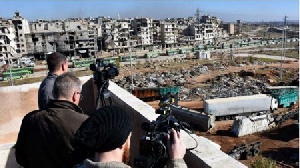A delegation of Syrian rebels attending a new round of talks in Kazakhstan's capital will not hold direct talks with representatives of the government, according to opposition sources.
The meetings in Astana, organised by Russia, Turkey and Iran, are aimed at strengthening a shaky ceasefire that has largely held despite incidents of violence across Syria.
"The first negotiation session will not be face-to-face because the government hasn't committed until now to what it signed in the December 30 agreement," rebel spokesman Yehya al-Aridi told AFP news agency on Monday, referring to the truce deal brokered by Turkey and Russia last month.
Al Jazeera's Mohammed Jamjoom, reporting from Astana, said the refusal to hold direct talks raised concerns about the effectiveness of the meeting.
"It is making diplomatic sources wonder how effective these talks will be, because these meetings really hinged on the idea that the rebels and government representatives will meet face-to-face," Jamjoom said.
"At this stage, there is a lot of concern behind scenes about how these talks will go."
The negotiations in Kazakhstan, which are expected be over by midday on Tuesday, are likely to be followed by United Nations-mediated diplomatic talks in Geneva, Switzerland, on February 8.
Experts say a breakthrough could see some of the armed opposition join the Geneva talks.
"The talks in Astana are not an alternative to the Geneva talks next month, but are an additional step," Vassilenko said.
Red lines
The December 30 truce has largely been holding, despite pockets of violence namely in the suburbs of the capital Damascus, where Syrian government forces have been advancing to retake strategic areas.
Bashar al-Jaafari, the head of the Syrian government delegation, told reporters on the plane to Astana on Sunday that the agenda would focus on strengthening last month's truce.
Jaafari played down Turkey's role as a party to the talks, saying they were between Syrians only.
"Turkey is violating Syrian sovereignty so there is no Syrian-Turkish dialogue," he said, a reference to Turkish support for anti-Assad armed groups in the north of Syria.
Syrian opposition officials also said they focused on securing the current ceasefire, and would not be discussing Assad's future during the talks in Astana.
"No one has discussed this [the future of Assad]," Yahya al-Aridi, spokesman for the opposition delegation and adviser to the High Negotiations Committee (HNC) told Al Jazeera on Sunday.
Assad was still a "red line" for the opposition, he explained, adding that there was "no context" for discussing the president's role after a potential political solution.
Although Ankara and Moscow have backed opposing sides of Syria's nearly six-year conflict, they have worked hand-in-hand in recent weeks to try to secure an end to the war.
US President Donald Trump's administration was invited to participate in the talks but did not send a delegation.
Washington will instead be represented by its ambassador to Kazakhstan, according to the State Department.
Staffan de Mistura, the United Nations special envoy for Syria, will also be attending the talks to play a supportive role.
UN envoy for Syria Staffan de Mistura on Sunday hailed the talks as a "good initiative", in comments carried by Russian news agencies.
France and Britain will also be represented at the ambassador level, according to a European diplomatic source.
Hundreds of thousands of Syrians have been killed during the war, which initially started when largely unarmed anti-government uprisings against Assad erupted in 2011.
More than 12 million people - approximately half of the country's prewar population - have also been displaced over the course of the war.
General News of Monday, 23 January 2017
Source: aljazeera.com

















